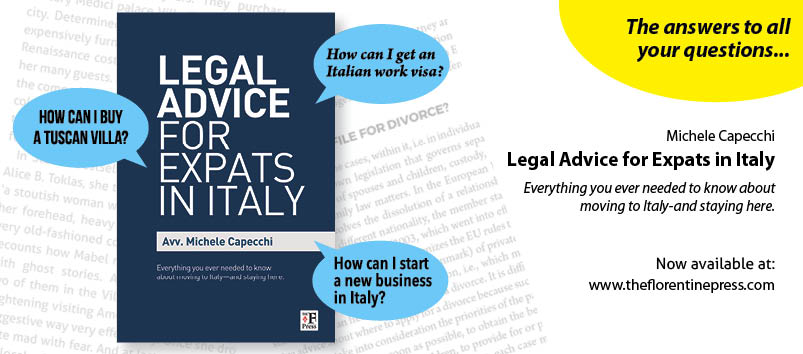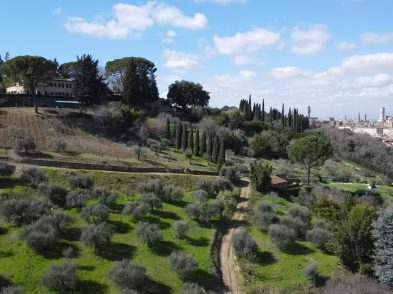It’s not all long lunches and glittering parties for those of us in the world of newspapers and publishing; sadly, nowadays, it’s rarely like that at all. The Florentine recently was forced to endure a legal tussle over a photograph we used as the basis for one of Leo Cardini’s inspired illustrations. Since the protest was levelled at the paper by someone in Germany and it strayed into the nebulous realm of intellectual property over the Internet, the directors of TF turned for advice to the publication’s legal columnist and the generally acknowledged ‘lawyer of the expats’ in Florence, Michele Capecchi.
Helen Farrell: First and foremost, a big thank-you from The Florentine for helping us to resolve the issue in question. Perhaps you can tell me a bit where we went wrong when it came to the legal aspects of intellectual property.
Michele Capecchi: You’re welcome, Helen. The problem of protecting one’s intellectual property, whether it’s related to design or brands, is becoming widespread because of new technologies and new ways of doing business online. So many people have blogs and websites now, but every time you present yourself you need to be extremely careful about whether all the words, all the pictures—everything really—is of your own production and creativity. Maybe you’ve been inspired by someone else’s work, but when the connection between the original work and your own creation is too close, you leave yourself vulnerable to potential legal claims from the original creator. It’s very delicate territory. While it can be easier to check for trademark registrations (with the proper legal support), it can be tricky to figure out whether what you find online, such as on Wikipedia for example, is actually copyrighted (since copyrights don’t need to be registered in order to exist).
HF: We’ll definitely bear that in mind from now on. Tell me a bit about your background, Michele. We always work together on your column, but I feel like I don’t really know you!

Photo credit: Sol Hill
MC: When I was in junior high school, I realized that I liked law. I would always stand up for other people. I’m a big guy, but I would never use my energy and bulk to sort things out. I preferred to challenge others’ bad behavior with good argument. I began studying law in Florence in 1994, when law school wasn’t yet so open to globalization and being international. After I got my law degree, my JD, in Florence, I started practising law in the same firm where I am now. I originally became passionate about mediation and arbitration. Mediation, negotiation, finding amicable agreements, this is what I am passionate about. There are so many cases and legal issues that can be resolved in other ways that don’t involve going to court… and I wanted to learn more and how to help out as many people as possible, not only Italians.
HF: So how did you go about doing that?
MC: In 2007, I decided to go to California to get my master’s degree in American law and international legal practice. My focus was on intellectual property and arbitration. I got my LL.M. and went to work as a visiting lawyer in New York, in the Wall Street area. In 2010, after a brief stint back in Florence, to find out more about how intellectual property works, I joined a Chinese law firm in Shanghai for four months. It was fascinating to find out about the counterfeiting of fashion and wine. We went undercover at international trade fairs to find out exactly what was going on. It was intense, working seven days a week. I enjoyed it!
HF: How has spending so much time overseas affected you personally?
MC: You become more humble. You view what’s here in Italy through different eyes. You understand that there are so many forms of culture. You understand that just because you come from the culla della cultura (cradle of culture) of Florence doesn’t mean other cultures are less valuable or important. You learn to appreciate the differences. You learn how to deal with the differences and how not to judge and how to be open-minded, and this is the first rule to follow when you are sitting at a negotiation table with people from cultures that are very different from your own.
HF: So, given all your international experience, why did you decide to base yourself in Florence?
MC: I came back to Florence for the quality of life. I love helping people find productive agreements, writing good contracts that prevent lawsuits, instead of ending up in long court battles. Because we’re so global now, I can work on these things here or from anywhere. Florence is the perfect place to be. I have clients in Abu Dhabi and in Switzerland, and most of the time I can work with them over Skype or email, meeting them in person when it’s necessary. I’ve found a perfect balance between being international and living in the city that I love. As you know, with the articles I write for The Florentine, apparently there’s a big demand for legal support.
HF: Indeed there is. The Florentine often receives emails about a whole range of legal issues, all asking for your advice as the ‘lawyer of the expats.’ What kinds of things are you asked about?
MC: I provide advice to people looking to use Florence and Italy as a base for their business. Sadly, I often receive requests about divorce and separation between international couples and the issue of custody. I also get requests from people who are about to get married, seeking help to prevent these problems; it is something that most people don’t want to think about—imagining the worst that can happen at what is supposed to be such a romantic moment—but they should.
The other big topic is immigration, which is of interest to many readers of The Florentine. It’s not only of concern to students who are trying to come here, but also to people who want to live and work here on a medium- to long-term basis. I am asked how to start a business here in Italy if you’re not from Italy or from the European Union. So, it’s not just a matter of how to convert your visa from a student to a work one, which is very common of course. One of the most interesting aspects of my job is how to help a foreign business to become a good business according to the law and immigration. It’s immensely rewarding!
Join Avv. Michele Capecchi and TF’s managing editor Helen Farrell at the first ever meeting of Expat Rotary Club of Florence. It’s an opportunity to discuss ideas and opinions about expat life in Florence over an aperitivo. Reservation required.Email h.farrell@theflorentine.net to reserve and for more info.
SEPTEMBER 17, 6PM
Grand Hotel Villa Medici, via il Prato 42









